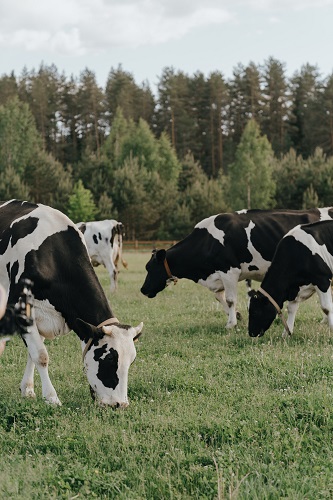Is A1 beta casein bad for autism? Expert explains

Milk seems to always receive a lot of attention within the autism community and in the media generally.
Some people believe that something in milk, called A1 beta casein, can be “bad” if you’re autistic.
So, should you stop drinking milk, and avoid A1 beta casein? Well, I am going to provide you with information on A1 beta casein and let you know what the research really says about it.
Summary
- A1 beta casein is a protein found in some animal milk, e.g., cow’s milk.
- The amount of A1 beta casein found in milk depends on the cow, not the cow’s diet or milk processing.
- A1 beta casein contains something called “BCM-7” which science has linked to higher levels of inflammation (stress chemicals in the body), and increased risk of some diseases, e.g., SIDS, type 1 diabetes, heart disease.
- Autistic adults may have higher levels of BCM-7 in their blood.
- BCM-7 levels in autistic kids have never been tested.
- It is not known if autistics will experience the same benefits (e.g., decreased inflammation) as everyone else if they were to avoid A1 beta casein because the research hasn’t been done yet.
- A1 beta casein does not cause autism or autism symptoms but might make life more difficult for autistics.
- More nutrition and diet research studies with autistics will help autistics make the best choices for their own health and wellbeing.
- You can avoid A1 beta casein by swapping from fresh animal’s milk to a plant-based milk; or by choosing a2 cow’s milk, which is available in Australia, China, and the USA.
What is A1 beta casein?
Casein is a protein that is found in the milk of cows, goats, and sheep.
There are many types of casein, but two important types are A1 beta casein and A2 beta casein. Casein makes up about 80% of the total protein found in cow’s milk.
But the amount of A1 and A2 found in milk depends on the breed and genetics of the cow.
Some cows don’t make any A1 beta casein, meaning their milk is naturally free of A1 beta casein. Currently, this milk can only be bought in Australia, China, and the USA.

Why is A1 beta casein said to be ‘bad’ for health?
A1 beta casein contains something known as beta-casomorphin 7 (BCM-7) which I know is a mouthful! BCM-7 is a peptide, which is a small piece of protein. A2 beta casein does not have BCM-7 in it.
Some human research studies have linked BCM-7 to:
- Higher inflammation (i.e., harmful stress chemicals in the body).
- Increased risk of type 1 diabetes.
- Increased risk of sudden infant death syndrome (SIDS).
- Increased risk of heart disease.
- Increased risk of lactose intolerance.
Research in animals and cells in laboratories also suggest that BCM-7 could lower immunity and increase the risk of infections.
Can A1 beta casein cause autism and autism symptoms?
First, let’s be clear that autism doesn’t have ‘symptoms’ and we should never be focused on ‘treating’ autism because it is not a disease. Autism is a neurodiversity, meaning it is simply a natural and different way that the brain works.
As it is not a disease, autism is not ‘caused’ by anything, and it does not need a cure. But people with autism have different health needs and their bodies may react differently to certain foods, medicines, or therapies than allistic (non-autistic) people.
If you would like to learn about what autism and neurodiversity is, or what words such as research study mean, read our glossary here: https://atypicalscience.org/about/glossary/
Okay, back to the topic of A1 beta casein.
The current research out there about whether there is a relationship between A1 beta casein and autism is not clear.
Several research studies have tested to see whether autistic adults have different levels of that BCM-7 in their blood and urine.
This is because some researchers thought that autistics may have higher levels of BCM-7 in their bodies than allistics. Let’s dive into what the current research tell us about this topic.
Four studies have been published which tested the levels of BCM-7 in autistics compared to allistics:
- The first study had 51 allistic and 86 autistic participants. The results found that autistics had higher levels of BCM-7 in their blood but not their urine: https://doi.org/10.3390/nu11010087.
- The second study had 296 allistic and 108 autistic participants. This study found no difference in the levels of BCM-7 between allistics and autistics: https://doi.org/10.1016/j.peptides.2014.11.012.
- The third study had 19 allistics and 23 autistics and this study found no difference in the level of BCM-7 between allistics and autistics: https://doi.org/10.1023/a:1025839807431.
- The fourth study had 10 allistic and 10 autistics and this study found that autistics had higher levels of BCM-7 in their urine: https://doi.org/10.1016/j.peptides.2014.03.007.
As I am sure you can tell, the research has conflicting results.
It isn’t known if there really is a true difference in levels of BCM-7 between autistics and allistics, and even if there is, what the cause of that is.
For example, did the autistic adults in the first and fourths studies simply drink more milk than the allistic adults in those studies.
This means that we need more and larger studies to be able to provide a clear answer as to whether autistic an allistics react to A1 beta casein differently.
Not to mention, if more studies tested the effect of A1 beta casein-free diets on the health and wellbeing of autistic kids and adults, we would be able to see whether a diet free from A1 beta casein could support autistics.
No single study has yet tested to see if an A1 beta casein free diet supports autistic kids or adults.
If this research was to be done, it would mean autistics could make better choices about their own health, which is what we want.
For more information about casein-free diets, check out my article: https://atypicalscience.org/gluten-casein-free-autism-diet/

Does cutting out A1 beta casein improve the health of autistics?
The answer to this question is not a definite yes or no, it is a maybe. The research shows that in a group of diverse people, A1 beta casein can increase the risk of some diseases and inflammation.
But that doesn’t mean every single person who has A1 beta casein in their diet will suffer those things, only that their risk goes up. Let me use an example:
- Person A: Consumes A1 beta casein most days, and never gets heart disease.
- Person B: Never consumes A1 beta casein, and still gets heart disease due to other things such as family history, overall diet, smoking, and access to medical care.
- Person C: Consumes A1 beta casein most days and gets heart disease. If person C never consumed A1 beta casein, they would never have got heart disease.
The problem is, for any single person like you or me, we don’t know if we are person A, person B, or person C.
So, if we want to decrease the risk of heart disease, to be safe we need to think and believe that we are person C and avoid A1 beta casein.
Of course, to avoid heart disease, we also need to live a healthy lifestyle and follow the advice from our own doctor and health care team.
Now, notice how I said, ‘person’ not ‘autistic person’? All this research has been done in groups of people who are not autistic, so we don’t know if autistics will get the same benefit.
But, for now, there is no reason to believe that an autistic person won’t get the same benefits as an allistic person. That is, just like an allistic person, an autistic person who avoids A1 beta casein may decrease their risk of SIDS, type 1 diabetes, heart disease and inflammation.
We all want to be healthy and live our best lives. Diet can play a big part in this.
In trying to improve their health and wellbeing, many autistic adults and parents of autistic kids are thinking of cutting A1 beta casein out of their diets, and if you choose to do this, that is okay.
But there is no reason to feel guilty if you choose to keep drinking regular cow’s milk, that is also okay.
If you want to know more about diet, nutrition, and autism, we recommend a subscription to the Autism Nutrition Library.
The library, developed by a Registered Dietitian, has online courses, recipes, and many nutrition articles for health and wellbeing.
If the library would support you and your family, you can use our referral link which gives you 20% of the first month*: https://bit.ly/38zcKLx (passcode: ATYPICAL)
Disclaimers and references
Authors
Article lead: Lara Cate Tupper (BNutrSci, MNutrDietPrac candidate)
Supporting author: Dr Skye Marshall (PhD, APD)
Meet our writers: https://atypicalscience.org/about/team/
Disclaimers
If this article contains words that are new to you, you can learn about them in our glossary: Glossary
All information provided on this website and in any of our associated platforms is general in nature and should not be considered as a recommendation or advice specifically for you or your networks, business, or others connected to you. The content of this article is for information purposes only, is not health or personal advice, and you rely on this information at your own risk.
Please seek individualized professional advice before making any decisions about health, medical, personal, business, or social care.
Lara Cate Tupper declares no conflicts of interest.
Dr Skye Marshall has previously received a research grant from The A2 Milk Company for health research that was unrelated to autism or neurodiversity. The A2 Milk Company have not sponsored this post, nor is there any affiliation, financial or otherwise, between The A2 Milk Company and Atypical Science.
* This post contains affiliate link to the Autism Nutrition Library. Atypical Science receives a commission if you buy something by following the link provided on this page. Purchasing via an affiliate link doesn’t cost you any extra, and we only recommend products and services which provide a real benefit and support to the neurodivergent community and which aligns with our values: https://atypicalscience.org/about/.
References
Cieślińska, A., Sienkiewicz-Szłapka, E., Wasilewska, J., Fiedorowicz, E., Chwała, B., Moszyńska-Dumara, M., Cieśliński, T., Bukało, M., & Kostyra, E. (2015). Influence of candidate polymorphisms on the dipeptidyl peptidase IV and μ-opioid receptor genes expression in aspect of the β-casomorphin-7 modulation functions in autism. Peptides, 65, 6–11. https://doi.org/10.1016/j.peptides.2014.11.012
Jarmołowska, B., Bukało, M., Fiedorowicz, E., Cieślińska, A., Kordulewska, N. K., Moszyńska, M., ŚWiątecki, A., & Kostyra, E. (2019). Role of Milk-Derived Opioid Peptides and Proline Dipeptidyl Peptidase-4 in Autism Spectrum Disorders. Nutrients, 11(1), 87. https://doi.org/10.3390/nu11010087
Kamiński S, Cieślińska A, Kostyra E. Polymorphism of bovine beta-casein and its potential effect on human health. Journal of applied genetics. 2007;48(3):189-98. 10.1007/BF03195213
Kuellenberg de Gaudry D, Lohner S, Bischoff K, Schmucker C, Hoerrlein S, Roeger C, et al. A1-and A2 beta-casein on health-related outcomes: a scoping review of animal studies. European Journal of Nutrition. 2021:1-21. 10.1007/s00394-021-02551-x
Nagamitsu, S., Matsuishi, T., Kisa, T., Komori, H., Miyazaki, M., Hashimoto, T., Yamashita, Y., Ohtaki, E., & Kato, H. (1997). CSF beta-endorphin levels in patients with infantile autism. Journal of Autism and Developmental Disorders, 27(2), 155–163. https://doi.org/10.1023/a:1025839807431
Olenski K, Kamiński S, Szyda J, Cieslinska A. Polymorphism of the beta-casein gene and its associations with breeding value for production traits of Holstein–Friesian bulls. Livestock Science. 2010;131(1):137-40. 10.1016/j.livsci.2010.02.023
Sokolov, O., Kost, N., Andreeva, O., Korneeva, E., Meshavkin, V., Tarakanova, Y., Dadayan, A., Zolotarev, Y., Grachev, S., Mikheeva, I., Varlamov, O., & Zozulya, A. (2014). Autistic children display elevated urine levels of bovine casomorphin-7 immunoreactivity. Peptides, 56, 68–71. https://doi.org/10.1016/j.peptides.2014.03.007
Trivedi M, Zhang Y, Deth R. Effect of A1 vs A2 beta‐casein containing diet on glutathione antioxidant status: Implications for inflammation and cognitive function via gut‐brain axis. The FASEB Journal. 2017;31:972.18-.18.
Thiruvengadam M, Venkidasamy B, Thirupathi P, Chung I-M, Subramanian U. β-Casomorphin: A complete health perspective. Food Chemistry. 2021;337:127765. 10.1016/j.foodchem.2020.127765
Truswell A. The A2 milk case: a critical review. European journal of clinical nutrition. 2005;59(5):623-31. 10.1038/sj.ejcn.1602104
Join our community
Sign-up for regular updates on new content and opportunities such as scholarships and resources.


